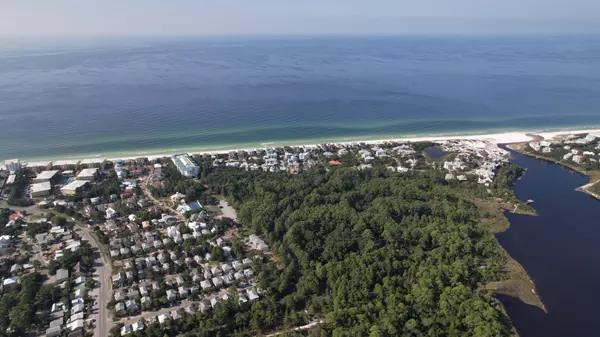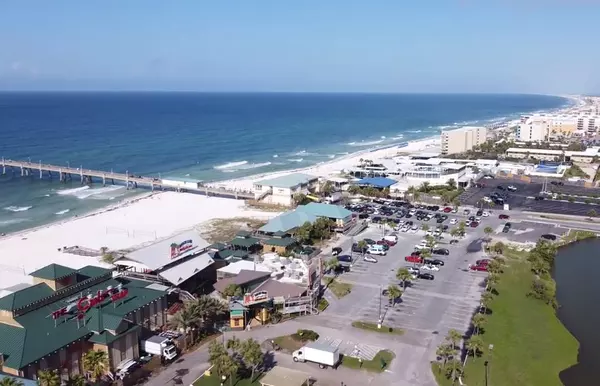Hurricane Prep on the Emerald Coast
Hurricane Prep on the Emerald Coast
So, you're moving to or just move to the Emerald Coast in the Destin Fort Walton Beach area and you're curious of what you need to do to prep for hurricane. Well, in this video, we're going to go over the things that you need to do to prep, the things to do during the hurricane, and of course, what to do after the storm came through.
So, let's talk about hurricane preparedness for the Emerald Coast.
Alright, so let's go into Preparation.
1. Make A Plan
Know what the evacuation routes are going to be. Have a primary and have a secondary because you never know what debris is going to go down or accidents or something like that. So, always have a backup. When you do decide to execute this plan, make sure to communicate what you're doing and where you're going with your family and friends, so somebody can keep track of you so that you're safe and accounted for. Make sure before you go that you already know where you're going to stay, whether that's a hotel, a friend's house, family. Know where you're going to go prior to that. During the storm, or right before is probably not a good time to figure that out. Also, I suggest making a checklist. Again, prior to the storm of everything that you want to bring with you. Now, don't bring everything in the house with you to include the kitchen sink. Don't literally take that out, that's pretty tough. Make sure that you write down your priority of what you need to bring for you, your family, and heck your pets, if they're coming with you, alright? Make sure to do that and I emphasize prior to the storm because if not, you're just going to be frantically moving stuff around. It'd be really nice to have a checklist and just check things off, so you know you got everything. Make sure also to have a to-go, or what we called military, a bug-out bag for you and the family. That way, you can simply just grab this thing and go. Go on to Amazon, get some of those pre-made things, and then just throw them in your bag. Forget about them until the time that you have to evacuate. Hopefully, you never do, but just in case you do, you got yourself covered. And, again, figure out what you're going to end up doing with your pets if you're taking them with you. If you're going to drop them off at a shelter, please, please, please just don't leave them in the house to survive to see if they make it through. Do have a plan for them as well.
2. Secure The Exterior Of Your Home
Install those storm shutters. Now, those could be shutters. It could be the fabric material that you put over the top. Heck, it could be plywood providing that it is at least secured to the exterior of the window or the doors or whatever that you're putting in there. Now, as I suggest to people that actually just purchase houses in this area. I always tell them to go ahead and do a dry run on a nice sunny day to figure out where all the hardware and everything goes. Right before you're about to evacuate is not the first time that you should be testing out and putting those things on first, okay? And plus, you might kind of freak out your neighbors putting that out and be like, oh there's a hurricane coming and you could have some fun with that. Alright, also, when you go out there, make sure to clear out any lawn furniture or anything else that could potentially be a projectile. When it comes to storms and it comes to hurricanes, the thing that is the most detrimental is the wind. Not physically the wind but what it can carry with it. So, it could be a lawn chair, it could be somebody's potted plant, it could be gutters. There's not much you could do about that. Any of those things could be flying through the air and definitely do some damage to property or people if you're outside. Please don't go outside. Also, you can get sandbags to prep the home. You can go ahead and get those on your door, so that it kind of offsets the initial surge if there is flooding to the house or any of the windows that are really close to the ground, you can also prep them with that as well.
3. Secure The Interior Of Your House
So, if you got expensive art or really nostalgic pictures up on the wall, make sure to take those down, wrap them in plastic and put them somewhere interior in the house, or just take them with you if they're that important. Also, move items off the floor if feasible because if the flood does come into your house, you'll at least be able to save those items. I know a lot of people keep computer towers and other things that are on the floor, try to pick them up, bring them to the second floor, whatever you can do to try to save that. Also, know to go ahead and put plastic over big electronic items, if you're trying to save that as well. Say TVs, monitors for your computer. If you do that and rain gets into the house while you're gone. If you decide or have to evacuate, you might be able to save them and still use them when you get back.
4. Move Your Cars
Alright, try to get into a higher ground or just move them into the garage and back up to the garage doors. One of the first things that like to fly off the house is surprisingly the garage door. Now, if you don't have that extra secure lock inside the garage door, you can usually mitigate this by putting sandbags or using your vehicle in this case to try to keep that thing from actually flying off the house. And it keeps the water from getting into your garage and soaking everything. So, don't put that car under a tree. That's not going to help because then it could come over and crash your car. Don't put it in a low-lying area because it could flood and don't put it under power lines. You don't need that thing to be an electric car, even though it wasn't intended to be.
5. Power Up
Go ahead and fill your car with gas, go ahead and charge your phones. If you've got a portable charger, make sure to charge those as well. If you have a generator, go ahead and test that prior to the storm coming in and make sure you got plenty of gas. Know that it typically has taken about three days for somebody to get to you to get the power back up to the house. So, make sure to go ahead and have enough for that.
6. Unplug Appliances
Go ahead and unplug your appliances. Move them away from windows, doors, just so you don't get zapped if those things are functioning and they're wet. And that could just be a bad combo altogether.
7. Store Important Documents
Alright, get them all consolidated in one area, whether you're going to take them to go or you're going to leave them at the house. So, what do you mean by that Tim? Well, legal paperwork, birth certificate, social security cards, marriage licenses, insurance policies with the number that you need to call for claims. That's really big, I would always keep that with you. Any valuables, jewelry, things of that nature, go ahead and either take them with you as I had said or put them in a bolted waterproof safe so that you'll know where it is when you get back and it's safe and good to go.
8. Emergency Kit
Alright, speaking of things to prep for, let's talk about prepping an emergency kit, which is number 8. What's an emergency kit? Well, it's what's important to you. But some good items to keep in there will be a flashlight with extra batteries, candles, portable radio. Yeah, an actual radio, not your cellphone. With some extra batteries with that so you can hear all the stuff that's going on in any warnings. Non-perishable food, you know ones that just never go bad like candy corn Twinkies, McDonald's french fries, just kidding. No, I mean like canned goods and things of that nature. Make sure to have at least three days worth of that. Same thing with water, know that you're going to have to have at least one gallon of water per person for three days. So, have at least that many gallons available to you. You can get big bladders. You can just get the gallon jugs and fill them up, whatever you need to do. Also, you can go to the bathtub, fill that with water as well, so that you can use that just in case you run out of anything else that you do have. Also, have cash because a lot of the time the electronics are down so we can buy anything with that. Blankets, extra clothing just because you're probably going to get wet. Toiletries, a first aid kit, just in case, if you're on meds, make sure to have those, a whistle just in case you need to project where you are a long-distance away and you just can't scream that loud. Have a dust mask as well, because once the debris and everything go down, and you start moving stuff around, it could put all that stuff in the air and if there's mold or something else in there that could really harm your lungs and if you have asthma or something of that nature could really hurt. Also, duct tape with plastic or tarp, so you can shelter in place. Those things are really going to help out if the storm leaves, rips some stuff off your roof, you can at least put those tarps up there to mitigate any further water damage into your house until such time we can get somebody out there to fix it. Have ranches or pliers, so you can turn off utilities. A food opener like a manual one, like a non-electronic can opener like an actual manual one, so you don't have to rely on the electricity. Local maps, so that you can find alternative routes out of that area. And if you have a pet, pet food, and associated stuff like leashes and their medication as well. The last one we have for preparedness is to identify a shelter-in-place. Build a bunker, right? Try to find a place that's interior that doesn't have any windows or it's minimal as possible. Have it on the first floor, central to everything, and then kind of keep it in there to keep yourself protected from the winds and flooding and things of that nature. So, if an associated tornado decides to pop up, that you'll be able to be in the safest part of the house. Now, if the water's do flood during that time, make sure to go up. If it's a two-story, go up to the second level to protect yourself from that.
During the Storm
Alright, so the storm is coming and you're going to wait it out. Awesome. That's what I would have done too.
1. Stay Inside
Alright, so first thing during the storm, what do you need to do is to stay inside. Keep yourself protected from the winds and the flooding. I feel like it just said that, yes, do that., alright? Don't walk swim or drive through the waters out there. We just don't know what's in them. There could be down power lines in there, debris, shards of glass, who knows. Just know that just six inches, 6 inches of fast, moving water can knock you down. So just be wary of that.
2. Stay Alert
So, if you have your phone, try not to drain it by playing any games or something on there. Have a radio with you so that you get those alerts. There could be flash flood alerts, tornadoes, all sorts of things you want to stay aware because if there is a mandatory evacuation because the storm gets bigger and bigger like Michael did in Panama City. You'll want to know that, so you get out of there and that could save your life.
3. Move to Higher Floors
If it starts to flood, go ahead and start moving to the higher floors, alright? One thing that I will warn you is don't go into your attic. If there's no way to get out of the attic, and they still have rising water, you could be drowned because you get trapped in there. So, don't put yourself in that scenario.
4. Distract Yourself
Keep your mind off this storm. Go ahead, play some board games, read a book, play ISpy. Be like, hey, I spy, something wet. Actually, that'd be a terrible game. You know, figure something out if you're with your family or friends or whatever. You can always figure something out to do that. People have thrown hurricane parties, where they kind of enjoy each other's company to keep their mind off the storm during that time.
5. Avoid Bridges
If you have to leave, stay off bridges over fast-moving water. Actually the storm in 2020 Sally that came through, actually knocked out a big portion of the bridge that went from Gulf Breeze to Pensacola. And that thing's almost brand new. So, it doesn't even have to be something moving fast water. It could be anything. So, go ahead and stay off those bridges and try not to put yourself in danger.
After The Storm
Okay, so the storm's over. What do you need to do now?
1. Listen To Officials
Well, first is to listen to the local officials and any info about special instructions. Whether you're staying in there or trying to get back to your property.
2. Be Careful During Clean-up
Be careful during your cleanup efforts. Again, make sure to take pictures before you start the cleanup. But just be careful because there could be, you know, some sort of electronic hazard. There could be cutting hazards, all these different things. So, make sure to go ahead which is number 3.
3. Protective Gear
Wear protective clothing, gloves, goggles, a mask, whatever you need to do.
4. Avoid Electrical Equipment
Don't touch any electrical equipment, especially if it's still wet and or in standing water because soon as you could do so, I'm sure you've seen the cartoons where they get zapped. Well, that could be you, don't get zapped.
5. Avoid Flooded Waters
Avoid wading through the flooded waters. We don't know what's under there if it's not a place that normally had water. So, there could be dangerous debris in there. So, be careful.
6. Use Social Media
After these storms go through, especially if they knocked out cell phone towers, that takes a little while for them to put up emergency ones for you, temporary ones. So, if you need to communicate, try to communicate with friends and family through social media and you can do it through text. Now, if you do need to call, make sure that you are patient because sometimes those systems can get overloaded, and just keep trying to until you can get what you need.
7. Document Damage
Document any property damage with photos and then go ahead and contact your insurance for assistance. The sooner you can get that claim in and get them exactly what they need, the sooner that your house can get fixed, and then you can start going back to normal life. So, go ahead and make sure that you get all that info soon.
8. Offer Help
The last one that we have for you is to be available for your friends, family, and neighbors who sometimes just need to talk after something traumatic like that happens. They may be freaking out, heck, you might be freaking out. Make sure to be able to be there for each other, and the other people that aren't part of this may be concerned about you. So, go ahead and reach out to them, give them, I'm all safe. You can use social media platforms to do so. Just make sure that everybody is good to go.
Alright, that's all that we have for you for Preparation and how to get through a hurricane here on the Emerald Coast. If you have any questions about anything that we spoke about, feel free to call/text us at 850.320.7757 or email us at Admin@WhittemoreGroupRE.com
Categories
Recent Posts










GET MORE INFORMATION

![<!-- begin Widget Tracker Code --> (function(w,i,d,g,e,t){w["WidgetTrackerObject"]=g;(w[g]=w[g]||function() {(w[g].q=w[g].q||[]).push(arguments);}),(w[g].ds=1*new Date());(e="script"), (t=d.createElement(e)),(e=d.getElementsByTagName(e)[0]);t.async=1;t.src=i; e.parentNode.insertBefore(t,e);}) (window,"https://widgetbe.com/agent",document,"widgetTracker"); window.widgetTracker("create", "WT-JTWWXHJC"); window.widgetTracker("send", "pageview"); <!-- end Widget Tracker Code -->](https://cdn.chime.me/image/fs/cmsbuild/2022820/12/h200_original_12b23b22-4a2a-4f96-8df9-274c8346f371-png.webp)